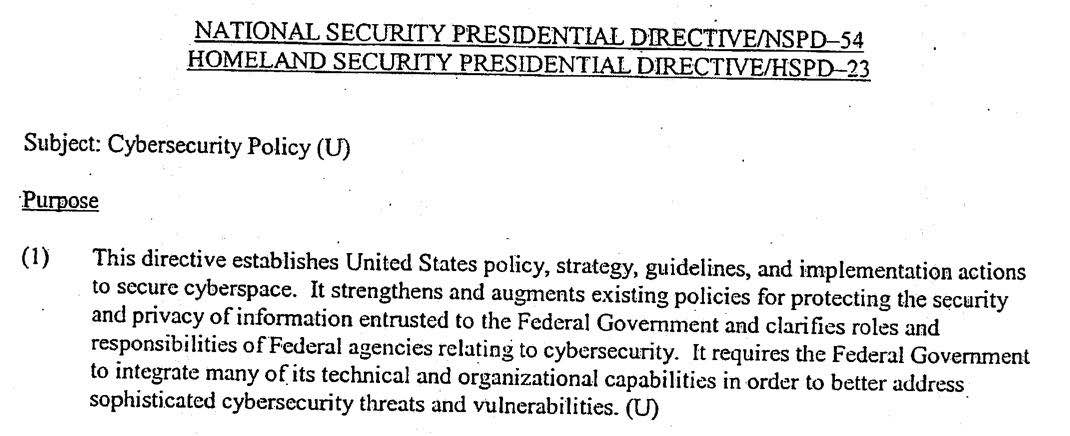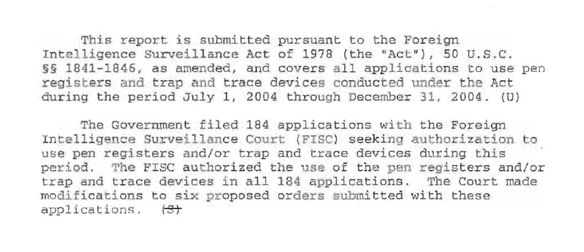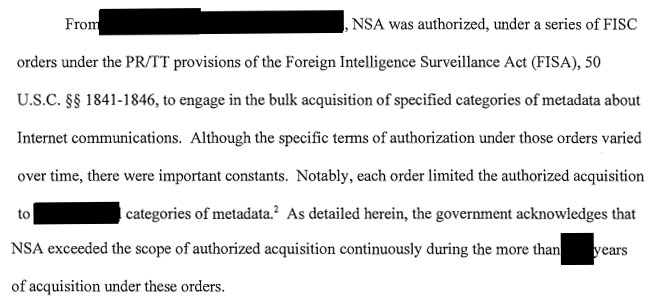FOIA Gallery 2015
Introduction to the Freedom of Information Act
The Freedom of Information Act establishes a legal right for individuals to obtain records in the possession of government agencies. The FOIA is critical for the functioning of democratic government because it helps ensure that the public is fully informed about matters of public concern. The FOIA has helped uncover fraud, waste, and abuse in the federal government.
A hallmark of the new surveillance measures proposed by various government agencies is their disregard for public accountability. As the government seeks to expand its power to collect information about individuals, it increasingly hides that surveillance power behind a wall of secrecy. Congress has long recognized this tendency in the Executive Branch, and sought to limit government secrecy by creating legal obligations of openness under the FOIA and the Privacy Act of 1974. EPIC has used these open government laws aggressively to enable public oversight of potentially invasive surveillance initiatives.
Public access through the FOIA not only allows for a more informed public debate over new surveillance proposals, but also ensures accountability for government officials. Public debate fosters the development of more robust security systems and leads to solutions that better respect the nation's democratic values. EPIC's FOIA litigation activity over the past year has resulted in disclosure of information about several government surveillance programs. The EPIC FOIA Gallery highlights some of the most significant documents we obtained in the past year.
Previous EPIC FOIA Galleries were published in 2001, 2002, 2003, 2004, 2005, 2006, 2010, 2011, 2012, 2013, and 2014.
For more information about EPIC's FOIA work, see EPIC: Open Government, EPIC: FOIA Cases, EPIC: Open Government Litigation Manual, and FOIA.ROCKS.
EPIC's FOIA Work in 2014
For EPIC's open government project, 2014 was a year filled with great success stories. Through vigorous and effective litigation, EPIC bolstered its record as a champion for a more open and transparent government. It is undeniable that EPIC added to the public debate by uncovering government documents. But EPIC's advocacy also forced government agencies to rethink the way they view privacy. For example, through a FOIA lawsuit, EPIC shined light on a DHS license plate reader program, which forced the agency to revise its own privacy guidelines and safeguards. In 2014, EPIC obtained records from government agencies including the CIA, NSA, FBI, DOJ, and Army. Many of EPIC's 2014 successes were featured in the news:
- CIA Sued Over Senate Spying, The Hill, Oct. 2, 2014.
- Billion Dollar Surveillance Blimp to Launch Over Maryland, The Intercept, Dec. 17, 2014
- Documents Released on U.S. Wiretapping Since Sept. 11 Terrorist Attacks, NY Times, Mar. 3, 2014
- ICE Twice Breached Privacy Policy With License-Plate Database, Washington Post, Oct. 29, 2014
- Privacy Advocates Sue Pentagon Over Internet Voting Test Results, Washington Post, Oct. 2, 2014
EPIC Obtains the Federal Government's Cybersecurity Policy
After five years of litigation, EPIC obtained a Presidential Directive concerning the implementation of federal cybersecurity policy. National Security Presidential Directive 54 (NSPD-54), contains the full text of the Comprehensive National Cybersecurity Initiative and "establishes United States policy, strategy, guidelines, and implementation actions to secure cyberspace." NSPD-54, which is the foundational legal document for all cybersecurity policies in the United States, describes government efforts to enlist private sector companies, increasingly monitor Internet activity, and develop offensive cybersecurity capability. EPIC first sought public release of the Directive through a FOIA request in 2009.
Pen Register and Trap-and-Trace Orders Granted by the FISC
Through a FOIA lawsuit, EPIC obtained semiannual reports to Congress showing how often the federal surveillance court granted pen register and trap-and-trace orders. Pen registers and trap-and-trace devices collect metadata from calls coming in to and going out of specific phone lines. The reports, prepared by the Department of Justice, show an explosion in orders in the years following September 11, reaching a high of 184 in 2004. In 2013, the Guardian reported that the Foreign Intelligence Surveillance Court (FISC) authorized the NSA to collect bulk email and Internet metadata using the Pen Register and Trap and Trace provisions of the FISA.
EPIC Shines Light on DOJ's Warrantless Wiretapping Program
EPIC obtained a mostly unredacted version of two key memos (OLC54) and (OLC85) by former Justice Department official Jack Goldsmith. The memos offer the fullest justification of the warrantless wiretapping program available to date, arguing that the president has inherent constitutional power to monitor American's communications without a warrant in a time of war. Some parts of the legal analysis, including possibly contrary authority, have been withheld. The warrantless wiretapping program was part of "Stellar Wind," a broad program of email interception, phone record collection, and data collection undertaken by the NSA without the approval of Congress.EPIC requested these memos just four hours after the New York Times broke the story about the program in December 2005.
DHS Revises Privacy Guidelines on National License Plate Reader Database
EPIC obtained documents showing that the Department of Homeland Security had disregarded its own privacy officials and privacy guidelines when it used license plate reader data. In response to public outcry, the agency had announced the previous spring that it was pulling a solicitation for access to a private license plate reader database. Documents obtained by EPIC indicated that despite public representations to the contrary, the agency went ahead and purchased the license plate reader database anyway. In response to a Washington Post report on the EPIC-obtained documents, the Department of Homeland Security revised its guidelines for access to the license plate reader database to create more privacy safeguards and accountability.
Army Surveillance Blimps Over Washington, DC
In response to EPIC's FOIA lawsuit, the Department of the Army was forced to disclose thousands of pages of documents about the surveillance blimps that have been launched outside of Washington, DC. The Department of the Army's documents indicated that the blimps are designed to identify and track "surface moving targets" including individuals and vehicles. EPIC's lawsuit resulted in significant media coverage, including a CBS This Morning segment. The agency has stated that it does not intend to integrate video surveillance, but EPIC is continuing to advocate for stronger privacy protections.
CIA Inspector General's Report on Spying on the Senate
After EPIC sued the Central Intelligence Agency under the FOIA, the agency publicly disclosed a redacted version of the CIA Inspector General's Report on the agency's surveillance of Congress. The Senate Intelligence Committee had been investigating the agency's use of torture over the last decade. The CIA Inspector General's report revealed that, in response to the Senate investigation, the agency unlawfully accessed Senate computers and attempted to create a Department of Justice investigation against Senate staff.
Share this page:
Subscribe to the EPIC Alert
The EPIC Alert is a biweekly newsletter highlighting emerging privacy issues.













